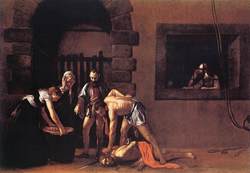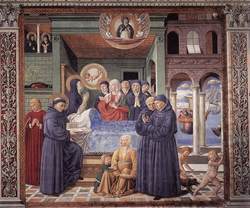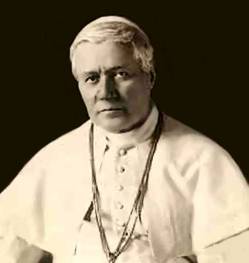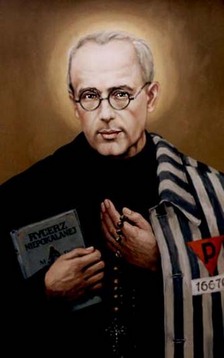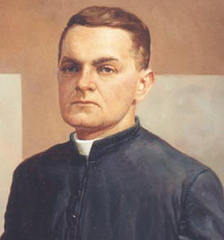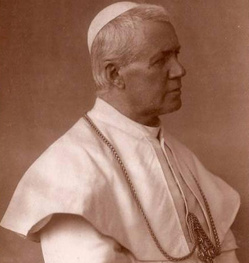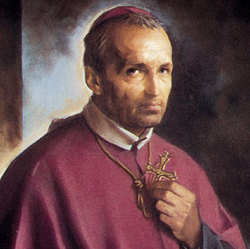Today is the great feast of Augustine, the convert (at age 32 at the hands of St. Ambrose in Milan) who was ordained a priest in 391 and elected bishop of Hippo in 395. His life and work are remarkable to say the least. In addition to Saint
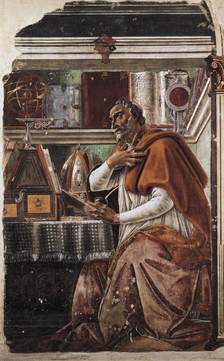 Thomas Aquinas, Saint Augustine is one of the Church's most significant theologians.
Thomas Aquinas, Saint Augustine is one of the Church's most significant theologians.
Calling Augustine "the greatest Father of the Latin Church," Pope Benedict spoke on three occasions in January 2008 to the gathered people in Vatican City about Augustine's life, his thought and his pastoral ministries. The texts of the Pope are found here:
In the meantime, I offer a 1930 text by Pope Pius XI on Augustine together for our reading pleasure right now.
For to begin with the queen of all the virtues, our Saint, leaving all else aside, made the love of God so completely the goal of his desires and efforts, and fed its flame so steadfastly in his soul, that he is fittingly portrayed as holding in his hand a burning heart. No one, who has even once turned the pages of the "confessions," can forget the conversion between mother and son, at the window of the house in Ostia. The narrative, with its lifelike charm, makes us feel that we see Augustine and Monica there, side by side, absorbed in the contemplation of heavenly things. He writes: "Alone together we held most sweet converse. Forgetting the things that lay behind and stretching out to those that were before, we questioned each other, in the presence of Truth, which Thou art, about the nature of the eternal life of the Saints, which eye has not seen, nor ear heard, nor hath it entered into the mind of man to conceive. Mentally with parted lips we hung over the supernal rills of Thy fountain--the fountain of life with Thee--if happily we might be refreshed, so far as our condition would allow, and in some sort ponder so profound a mystery... And while we conversed with eager longing, with the heart's supreme effort we made some approach thereto. We sighed and there left fettered the firstlings of the spirit, then to return to the sound of our voices, where the word begins and ends. Yet what bears any likeness to Thy Word, who is our Lord, who abides within Himself and ages not, who makes all things new?"
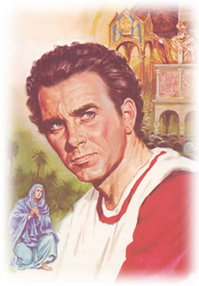 We must not imagine that it was an exceptional thing for Augustine thus to lift mind and heart above the life of the body. Any time he could spare from his daily duties and tasks, he devoted to meditation on the Sacred Scriptures he knew so well, that he might draw thence the relish and the light of truth. Rising on thought's pinions from a consideration of the works and mysteries that reveal God's surpassing love for us, he was borne aloft little by little to the Divine perfections themselves, into which he plunged--if we may so speak--as deeply as the heavenly grace given him allowed.
We must not imagine that it was an exceptional thing for Augustine thus to lift mind and heart above the life of the body. Any time he could spare from his daily duties and tasks, he devoted to meditation on the Sacred Scriptures he knew so well, that he might draw thence the relish and the light of truth. Rising on thought's pinions from a consideration of the works and mysteries that reveal God's surpassing love for us, he was borne aloft little by little to the Divine perfections themselves, into which he plunged--if we may so speak--as deeply as the heavenly grace given him allowed.
"Often I do this [he says, sharing with us his secret], this is my delight, and withdrawing from such activity as necessity imposes, I take refuge in this kind of pleasure. In all the things traversed by my mind, while I confer with Thee, I find no safe place for my soul except in Thee. In Thee are linked in unison my wandering strains. From Thee may nothing of mine depart. Sometimes, too, Thou dost admit me to a deep and unwonted interior emotion, to an indescribable sweetness. If that he brought to its perfection within me, I know of nothing which that life will not contain."
Hence it was that he cried: "Too late have I loved Thee, O beauty so ancient, yet so new! Too late have I loved Thee!"
Again, how lovingly he contemplated the life of Christ, striving to reproduce an ever more
 perfect image of it in himself and to repay love with love. In his counsel to virgins, he impressed on them the same lesson: "Let Him be fixed deep in your heart, who for you was fastened to the cross." As his love of God burned with a more ardent flame as days went on, so too did he make incredible progress in the rest of the virtues. No one can refuse his admiration to a man--whom all venerated, extolled, consulted, hearkened to for his lofty genius and sanctity--both in his writings destined for publication and in his letters, making it his great concern not only to refer to the Author of all good the praise offered himself, as being due to God alone, and to encourage and praise others, as far as truth allowed, but also to lavish honor and reverence on his colleagues in the episcopate. These were especially his mighty forerunners, such as Cyprian and Gregory of Nazianzus, Hilary and John Chrysostom, Ambrose--his master in the Faith--whom he revered as a father and whose teaching and life he was wont to recall. But especially there shone with luster in our Saint the love of souls, a love inseparable from love of God, of those souls particularly who were committed to his pastoral care.
perfect image of it in himself and to repay love with love. In his counsel to virgins, he impressed on them the same lesson: "Let Him be fixed deep in your heart, who for you was fastened to the cross." As his love of God burned with a more ardent flame as days went on, so too did he make incredible progress in the rest of the virtues. No one can refuse his admiration to a man--whom all venerated, extolled, consulted, hearkened to for his lofty genius and sanctity--both in his writings destined for publication and in his letters, making it his great concern not only to refer to the Author of all good the praise offered himself, as being due to God alone, and to encourage and praise others, as far as truth allowed, but also to lavish honor and reverence on his colleagues in the episcopate. These were especially his mighty forerunners, such as Cyprian and Gregory of Nazianzus, Hilary and John Chrysostom, Ambrose--his master in the Faith--whom he revered as a father and whose teaching and life he was wont to recall. But especially there shone with luster in our Saint the love of souls, a love inseparable from love of God, of those souls particularly who were committed to his pastoral care.
Pope Pius XI, Ad Salutem Humani (On Saint Augustine), 20 April 1930
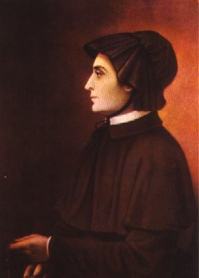 to read on America's first canonized saint, Elizabeth Ann Seton. Sister of Charity Regina Bechtle's article "An American Daughter: Elizabeth Ann Seton and the birth of the U.S. Church" is a good read for those generally interested in matters pertaining to Catholicism in America. Who wouldn't be thrilled to know that Saint Elizabeth Ann Seton is the first American born canonized a saint by Pope Paul VI in 1975?
to read on America's first canonized saint, Elizabeth Ann Seton. Sister of Charity Regina Bechtle's article "An American Daughter: Elizabeth Ann Seton and the birth of the U.S. Church" is a good read for those generally interested in matters pertaining to Catholicism in America. Who wouldn't be thrilled to know that Saint Elizabeth Ann Seton is the first American born canonized a saint by Pope Paul VI in 1975?
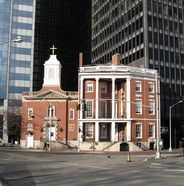 are two:
are two:
